|
|
Posted 7/2/2012 (link)
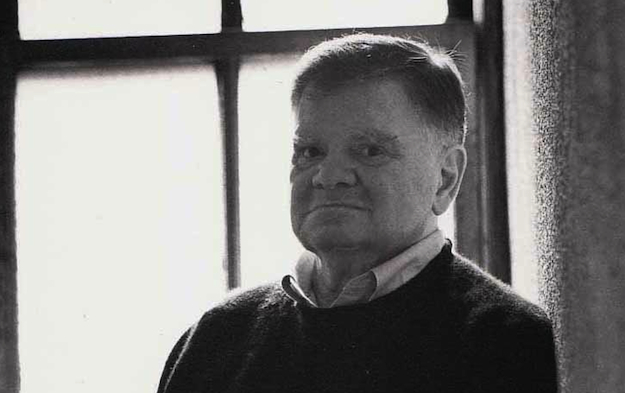 We wanted to draw your attention to a massive and ambitious new feature on the much-neglected New York School poet James Schuyler that we posted on Jacket2 this weekend. Organized by David Kaufmann, "A Schuyler of Urgent Concern" includes contributions from Bill Berkson, Ken Bolton, William Corbett, Maude Emerson, Andrew Epstein, Nathan Kernan, John Koethe, Marit MacArthur, David Mikics, Stephen Paul Miller, Charles North and Ron Padgett, along with Kaufmann and Schuyler himself. The range of materials gathered here is quite impressive, from substantive critical (re)appraisals to poetic personal remembrances, journal entries, brief considerations of the poet's work, and even a birthday collage poem that Schuyler sent to Berkson in the 1960s.
To start exploring this wonderful new feature, click here to visit its introduction / table of contents page, and to dig even deeper, don't forget our own James Schuyler author page or Pam Brown's earlier Jacket feature on Schuyler from issue #29 (2006).
Posted 7/6/2012 (link)
 We'll keep our focus on the New York School during this holiday-shortened week, highlighting a stellar recent addition to the PennSound archives from Harvard University's Woodberry Poetry Room.
Recorded on April 5, 2011 as part of the Woodberry's marvelous Oral History Initiative, this recording (presented as both MP3 audio and streaming video) features two New York School legends, John Ashbery and Ron Padgett discussing their friend and equally legendary colleague Frank O'Hara. Padgett begins the event, offering brief introductory comments on his discovery of O'Hara's work and his first meeting with the poet, before serving as Ashbery's interlocutor for the remainder of the evening. Given the Cambridge setting, the discussion starts with the circumstances of Ashbery and O'Hara's early friendship as Harvard undergraduates bonding over poetry. From there, Padgett and Ashbery aim to trace a chronology of the latter's relationship with the poet, leading up to his tragic and premature death in 1966.
This new conversation is only the latest addition to the PennSound archives from the Woodberry Poetry Room — along with a number of readings (from Wallace Stevens, Pierre Joris, Charles Bernstein, Robert Creeley and Ashbery), we've also been honored to host two previous Oral History Initiative events devoted to Denise Levertov and Charles Olson.
Posted 7/9/2012 (link)
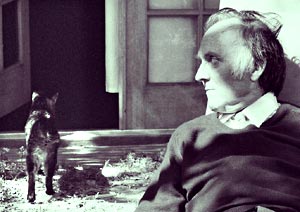 One of our most fruitful summer projects has been making our way through the archives of David Levi Strauss, which have already yielded a number of fascinating recordings, including last month's discovery of Charles Olson's infamous reading at the 1965 Berkeley Conference. Today, we're highlighting a half-dozen new recordings of Robert Duncan that have come from David's collection.
While, not surprisingly, the lectures and reading presented here cover a broad array of topics — from Walt Whitman to Emily Dickinson, Olson's Projective Verse to Robert Browning's thorny narrative epic, Sordello — they do occupy a relatively narrow chronological and geographic frame, having been recorded during the early 80s in the Bay Area. We start with two lectures at the Zen Center from February and March 1980 and what appears to be a companion talk labelled "Beginning with Sordello..." from later in the month of March. Next there's a March 1981 reading at Intersection for the Arts that includes "The Dignities," "The First," "Stimmung," "Enthralled" and "Blood's Domain," among other titles. From the summer of 1981, we have a pair of three-part lectures at the New College of San Francisco, starting with Walt Whitman and continuing with Emily Dickinson. Finally, from February 1982, also at the New College, there's a nearly two-and-a-half hour lecture "On Olson and Projective Verse."
Posted 7/11/2012 (link)
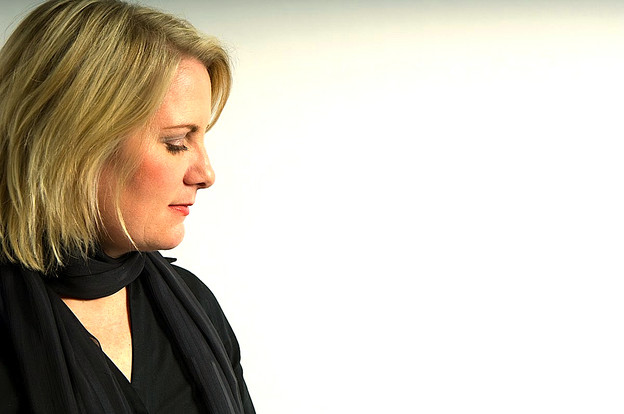 This week we released the fifty-fifth episode in the PoemTalk Podcast Series, which addresses Jennifer Moxley's "The Atrophy of Private Life." For this program, host Al Filreis was joined by a geographically diverse panel that included Cathy Eisenhower (from Washington, DC), Christopher Schmidt (from New York) and Jacket2's interviews editor, Katie Price (from Philadelphia). You can read Filreis' full write-up of the episode on the PoemTalk blog on Jacket2, but here's a brief tease that includes the panelists' reasons for selecting this particular poem and the opening of their conversation:
We took up [Moxley's 2007 volume] The Line because it would seem to enable us to talk about the situation or state of the poetic line — the poetic unit of language, the aesthetic or politico-aesthetic lineage — and we chose "The Atrophy of Private Life" within that book because the meta-poetic sense of "the line" would have to be at best implicit and we wanted to push ourselves to consider a possible critique of the sorry or depressed state of contemporary private life as itself a kind of line (as in ideological line) in such a way that the three senses of "line" — (1) poetic unit, (2) aesthetic lineage, where a poet fits or doesn't fit, and (3) political stance — might converge unevenly and uneasily yet revealingly.
Private life is becoming emaciated and "the sets of relations are very limited" (notes Cathy), and so aptly we are in "a house strewn with fashion magazines." The piece contends, seemingly straight out, that the destruction of the poetical has been mostly caused by the fabulously rich. The poet unmasks American bounty as actual impoverishment. Is Moxley really suggesting these things directly? Cathy says yes — and also no. "There's a lot of switching going on — with 'meaning' and 'money.'" If those two terms were "flipped," adds Cathy, "I'm not sure it would matter that much."
PoemTalk is a co-production of PennSound, the Kelly Writers House, Jacket2 and the Poetry Foundation. If you're interested in more information on the series or want to hear our archives of previous episodes, please visit the PoemTalk blog, and don't forget that you can subscribe to the series through the iTunes music store. Thanks, as always, for listening!
Posted 7/13/2012 (link)
 We wanted to make sure that you didn't miss out on poet, translator and Ugly Duckling Presse editor Matvei Yankelevich's recent appearance on Charles Bernstein's Close Listening.
Recorded in New York City on June 8th of this year, Yankelevich's ninety-minute appearance is split into two programs. In the first, Yankelevich reads recent work, including selections from his 2012 United Artists collection, Alpha Donut and the new poem, "Some Worlds for Dr. Vogt." This is followed by a second program: an hour-long conversation with Bernstein that encompasses a wide array of topics, including ekphrasis, Yankelevich's Russian and American identity, the connections between samizdat and small press publishing, the origins of Ugly Duckling Presse, his design aesthetics, and much more.
PennSound's Matvei Yankelevich author page, you'll find this program along with a wide variety of other recordings, including appearances on Cross Cultural Poetics, LA Lit, Radio Poetique and A Voice Box, and readings from the Segue Series at the Bowery Poetry Club, the St. Mark's Poetry Project and more.
Posted 7/16/2012 (link)
 We're starting this week by highlighting two of the latest additions to the PennSound archives — a pair of new PowerPoint videos by poet Tan Lin, which Charles Bernstein recently highlighted on his Jacket2 blog.
First up we have the forty-minute Bibliographic Sound Track, a stark and silent textual catalogue. That's followed by The Ph.D Sound, a fifteen minute video that mines much of the same visual material, though the sprawling and glitchy soundtrack by dj Mosco produces a very different effect for viewers. Both films were produced for Artists Space earlier this year. Video projections of the work were screened at Ludlow 38/Mini Goethe Institute on March 31, 2012 and will be shown at Artists Space on July 24, 2012.
If you enjoy these pieces, you'll also want to check out our earlier collection of three flash videos by Lin: Eleven Minute Painting (2002), Dub Version (2002) and Disco Eats Itself (Broken Disco Parameter) (2007). You'll find links to these films plus a number of readings and radio appearances on our main Tan Lin author page.
Posted 7/18/2012 (link)
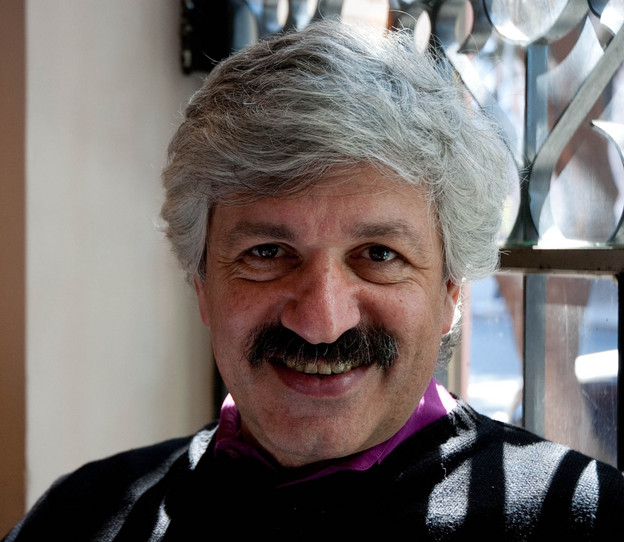 Earlier this year, we noted the passing of the influential Argentinian poet, critic, translator and publisher, Jorge Santiago Perednik (1952–2011). Today, we'd like to highlight a new video of the poet that was recently added to his PennSound author page.
Shot by Ernesto Livon-Grosman, this brief video showcases Perednik reading his poem, "Poetarzan." Over at Jacket2, you'll find a recent commentary post by Charles Bernstein, which announces the video, and provides a recording of Bernstein reading Molly Wiegel's translation of the poem, along with the English-language text of it. Bernstein's also included links to earlier posts on Wiegel's translation of Perednik's The Shock of the Lenders and Other Poems (Action Books, 2012), including the translator's introduction to that volume.
Fans of Perednik's poetry will also want to check out the two recordings housed on his PennSound author page: a 1994 reading at SUNY–Buffalo and a 1998 recording from the Radio Reading Project.
Posted 7/20/2012 (link)
 On March 4, 1968, poet Louis Zukofsky gave a fifty-minute reading at Buffalo's Albright-Knox Gallery as part of the Buffalo Festival of the Arts. While this recording has been part of PennSound's archives since we launched our Zukofsky author page in November 2008, it's only recently been segmented, and we wanted to draw our listeners' attention to it.
The evening begins with a brief introduction from Robert Creeley, who praises Zukofsky's "decisive books" for "the particular use and eminence he has in the context of American poetry," along with the way in which the poet embraces "being in his life, specifically for all that that life encompasses — either his years or moments or days or hands or feet or eyes — in a way so articulate that this sounds continually in the works that he has thus given birth to." Zukofsky begins his set with a excerpt from "A" – 12, continuing with "Catullus 63," "Song 5," "Song 24," "Song 15" and "Song 27," before returning to "A" for his final selections: that poem's 11th and 19th sections in their entirety, along with the second half of section 9.
Of course, this reading is but one of many recordings that you'll find on PennSound's Louis Zukofsky author page, including more than twenty readings, several scholarly events and discussions of Zukofsky's work and a modest collection of other poets reading his work. To start exploring, click on the title above.
Posted 7/23/2012 (link)
 Here's another recently-added recording from the archives of David Levi Strauss that very nicely complements the newly-segmented Louis Zukofsky reading that we highlighted in last Friday's PennSound Daily.
Recorded on April 22, 1988 at SPD, "Syntax as Music," is a nearly two-hour-long presentation on Zukofsky's life and work featuring Levi Strauss, Ronald Johnson and Michael Palmer, who read from the poet's collected writings, share their own appraisals of his work — in the process providing a broad contextualization of contemporary critical responses to it as well — before engaging their audience in a Q&A session. This fascinating document now joins the other recordings of critical symposia and discussions of Zukofsky's work catalogued in Friday's entry.
Posted 7/26/2012 (link)
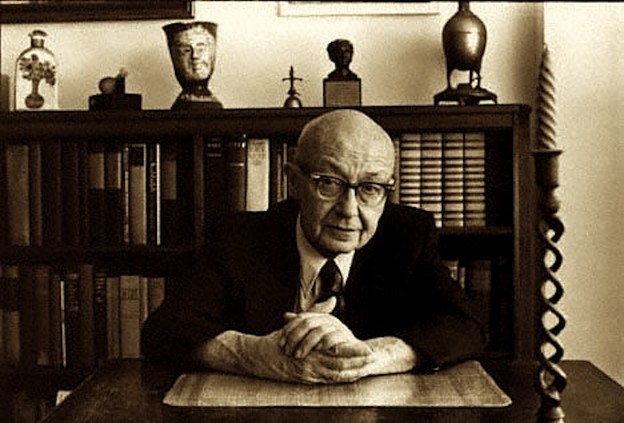 Today sees the launch of the fifty-sixth episode in the PoemTalk Podcast Series, in which two poems from Charles Reznikoff are discussed: the first, "Salmon and red wine" from Inscriptions; the second "During the Second World War I was going home one night," from the series By the Well of Living and Seeing. For this program, host Al Filreis is joined by Peter Cole, Michelle Taransky and Henry Steinberg.
"One poem is something of an ars poetica," Filreis tells us in his write-up of the episode on the PoemTalk blog on Jacket2, "even though, as Peter points out, its status as metapoetry makes it an unusual effort at statement for Reznikoff, who wrote more often as he did in our second poem, which tells of — and apparently means — only what it is and tends to resist larger conclusion." You can read the rest of that program summary here, where you'll also links to the recordings from PennSound's Reznikoff author page and bibliographic contexts for both poems.
PoemTalk is a co-production of PennSound, the Kelly Writers House, Jacket2 and the Poetry Foundation. If you're interested in more information on the series or want to hear our archives of previous episodes, please visit the PoemTalk blog, and don't forget that you can subscribe to the series through the iTunes music store. Thanks, as always, for listening!
Posted 7/31/2012 (link)
 Here's a newly-added talk by the inimitable Marjorie Perloff: "To Change Your Life: Wittgenstein on Christianity," is part of "Modernism, Christianity, and Apocalypse," a conference organized at the University of Bergen in Norway earlier this month. Here's Perloff's abstract of the presentation:
In a 1946 notebook entry reproduced in Culture and Value, Wittgenstein writes, "Christianity says, I believe, that sound doctrines are all useless. That you have to change your life. (Or the direction of your life." As early as 1916, in the midst of World War I, Wittgenstein regarded this changing of one's individual life as his crucial aim, even as he rejected theory, doctrine, or metalanguage of whatever kind. Again, he remarked, "Christianity is not a doctrine, not, I mean, a theory about what has happened & will happen to the human soul, but a description of something that actually takes place in human life." I shall argue here that this view of Christian belief as personal transformation, not uncharacteristic of the Vienna of Wittgenstein's youth, signifies for an understanding of MODERNISM in the shadow of World War I.
You can listen to the complete recording on PennSound's Marjorie Perloff author page, along with many other lectures, interviews and symposia.
|
PennSound Daily archive
2023
2022
2021
2020
2019
2018
2017
2016
2015
2014
2013
2012
2011
2010
2009
2008
2007
|











